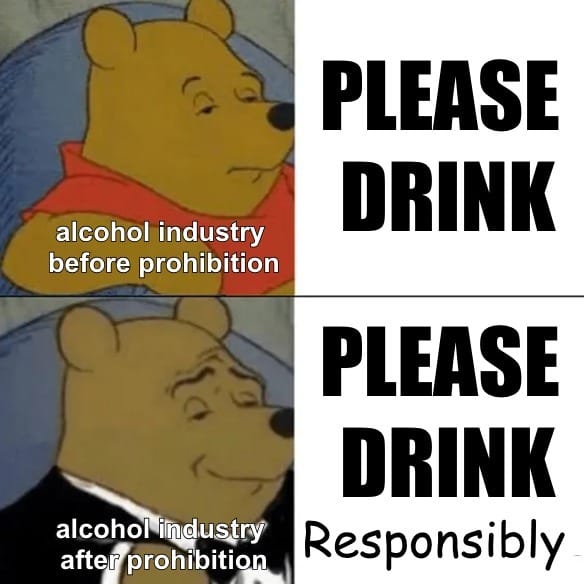- Fingers
- Posts
- "Moderate" drinking has always been a moving target
"Moderate" drinking has always been a moving target
The Fingers Podcast with historian Lisa Jacobson on the booze industry's post-Repeal redemption
Editor’s note: Behold, the triumphant return of The Fingers Podcast! I’m still working out some kinks, and need to migrate the old episode archive, but I hope to publishing more long-form audio interviews soon. As before, episodes will be exclusively for paid subscribers.
Programming note: No Weekender this Sunday on account of the holiday weekend. Hope you’re able to relax a bit. Fingers will be back in your inbox next week.—Dave.


Anybody who watched the de facto federal ban on hemp-derived tetrahydrocannabinol (THC) take shape in early November 2025 intuitively understands that both the booze industry and the government have a major influence on the way we get… well, under the influence. Still, it was unusual to see major beer, wine, and spirits trade groups line up in favor of an effective death sentence for another intoxicating vice, given the sector’s own experience with capital-P Prohibition. I guess regulation looks different when you’re on the right side of the food-drug divide.
As historian Lisa Jacobson lays out in her 2024 book Intoxicating Pleasures: The Reinvention of Wine, Beer, and Whiskey after Prohibition, the beverage-alcohol business didn’t just magically wind up in the (relatively) good graces of Uncle Sam and society writ large. Its post-Repeal redemption was a hard-fought battle that took many years of work and many, many marketing dollars, all focused on convincing policymakers, public-health officials, and the American drinking public itself that drinking was less a form of drug abuse than the agricultural, culinary, and patriotic pursuit of moderate, socially acceptable leisure. And of course, that it could, and would, be done “in moderation.”
Jacobson, a professor of history at the University of California Santa Barbara, joins me on The Fingers Podcast to talk about the calculated, coordinated, and quite successful campaign to bring drinking back into upstanding American life.
The transcript excerpts below have been lightly edited for length and clarity. Paying Friends of Fingers can listen to the full podcast episode using the link below.

🤝 Consider upgrading to a paid subscription!
To access The Fingers Podcast, and the rest of Fingers’ award-winning independent journalism about drinking in America, please purchase a subscription:
Fingers is 100% reader-supported and AI-free. Your paid subscription directly funds more work like this. Hope to see you on the other side of the paywall.—Dave.

💡 A few highlights from the episode
On the trade redefining what “intoxication” meant…
Lisa Jacobson: So the early political overtures are, Let's see if we can get some openings for low-alcohol beer and light wines by modifying the Volstead Act. Which is the legislation enabling the 18th Amendment. The only way you can do that is to enter a debate about what is intoxicating. The 18th Amendment bans “intoxicating” beverages, but it's only the Volstead Act that defines it. So the industry thought, Maybe we can modify the Volstead Act to get rid of this ridiculously restrictive definition of intoxicating beverages, which puts it at 0.5% alcohol by volume.
There are congressional hearings that go on for weeks right after the landslide election of Franklin Delano Roosevelt, and you have these huge Democratic majorities in the House and the Senate, and they're eager to do what they can to bring back beer part as a revenue-enhancing benefit, but also bringing back jobs. And these congressional debates lay the foundation for the legislative, legislative mess that really comes later. But the brewers make the argument, and they're really backed up by scientists who ultimately are the ones who persuade Congress to legalize beer early, several months before full scale Repeal takes effect. And they make the argument that beer, at 3.2% [ABV] is non-intoxicating, and part of the argument that the scientists put forward is that alcohol intoxication is not determined by potency alone, that context matters.
Reply